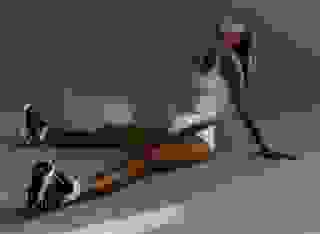- Romance
- Born Lucky
Note: You can change font size, font face, and turn on dark mode by clicking the "A" icon tab in the Story Info Box.
You can temporarily switch back to a Classic Literotica® experience during our ongoing public Beta testing. Please consider leaving feedback on issues you experience or suggest improvements.
Click here'Tis better to be born lucky than to be born rich. That's what my grandfather reckoned. 'If you are born lucky,' he used to say, 'there's a good chance that you will end up both happy and rich – well, rich enough anyway.'
Titch Titchborne was certainly born lucky. You may remember him as the bass player from Blackbeard's Daughter. Not that he was much of a bass player. Oh, he got better with time; but in the early days he was almost beyond bad. It was just his good luck that he happened to be hanging out with Mike Pelorus and Danny Smith when they decided to form the band.
As Titch told the story, he and Mike were drinking coffee in the Cosy Corner Coffee Bar when Mike asked him if he could play bass. 'Well, yes, sort of,' Titch had told him. 'You know ... just the basic stuff.' By basic stuff, Titch meant a few three-chord riffs in the key of A and a few more in the key of G.
Mike had said that 'basic stuff' was all they needed. 'And anyway, you look like a bass player. That's the main thing.'
And, yes, Titch certainly did look the part back then. He was lucky that he was a tall skinny kid with an angelic face, big hands, and a shock of reddish-blonde hair that fell in soft unruly curls. It also helped that he had sort of 'inherited' his older brother's Fender Jazzmaster bass when Malcolm Titchborne had decided to renounce rock and roll and enter the priesthood.
But perhaps Titch's greatest stroke of luck had come when the band was recording its first album, The Sound of Distant Plunder.
Mike and Danny had been in the control room with their producer, Pete Bateman, and the sound engineer. And while Titch waited for them to sort out whatever it was that they were sorting out, he had started trying to work out the bass line to Caravan, the 1936 Juan Tizol composition made famous by Duke Ellington. Titch got nowhere near it. But he did stumble across a catchy little riff that just came to him from out of nowhere.
Talking about it later, Titch recalled that Mike had come rushing back into the studio saying: 'Oh, yeah. Jeez, I really like that. That's really cool. We've got to do that one, man. What's it called?'
'Umm ... Camel Dance?'
And the rest, as they say, is history.
Camel Dance was the first and last hit that Titch 'wrote'. But, thanks to its initial success and the fact that it was recorded by more than 20 other artists and used in no fewer than three successful movies, it allowed him to buy Bledley Manor and a lifetime's supply of very good single malt Scotch, Titch's recreational drug of choice.
By the time I moved in to the cottage next door to Bledley Manor, Titch had pretty much retired. He still played occasionally. He even had the odd outing with Mike and Danny. But most of his time was spent being a regular on shows like Never Mind the Buzzcocks and tinkering with his collection of vintage motorbikes.
The one area of Titch's life in which his luck was a little less reliable was women. As a good-looking guy – and a minor rock god – he had no difficulty in attracting attractive women. He even married a couple of them. But none of his relationships lasted very long.
His first wife, Monica, was the lead singer in a band that promised a lot but never quite delivered. I got to know Titch and Monica when they were my upstairs neighbours in Notting Hill. I never quite understood how they came to be married. They seemed to spend all of their time arguing. Hardly a day went by when I didn't hear Monica reading the riot act at the top of her voice or giving Titch his latest 'absolutely-final' ultimatum. Eventually Titch moved out.
By the time we became neighbours for the second time – out in 'the flatlands' – Titch had divorced Monica. He had also had several other tempestuous relationships; married his second wife, Hannah, and divorced her; and was supposed to be having an on-again off-again relationship with Celia Blackstone, the award-winning portrait painter. At least that's what the gossip mags reckoned. By then Titch was in his early 50s; Celia was just 35.
I'd met Celia a few years earlier in London. Dunbar Keith had this idea for a coffee table book featuring ten of the new generation of portrait painters. It was to be called 'New Faces', a reference to both the painters and their works. Dunbar wanted me to write a profile of each of the artists and Celia was to be the guinea pig. In the end, the project was shelved. But not before I had spent a very enjoyable afternoon with Celia at her studio. I think had I not been in a relationship at the time, I might well have invited her back to my place to see my etchings.
On the day that I moved into Partridge Cottage, Celia was my first visitor. It was early evening, probably about 6:30. The moving guys had left and I was just trying to get the kitchen sufficiently organised to allow me to make a snack. It had been a long time since breakfast.
'So it is you. I thought it was.' Celia was standing at the open kitchen door with a quizzical smile. 'I was going to do the neighbourly thing and make you some scones,' she said. 'But I thought that you might be just about ready for a drink.' She was carrying a bottle of Veuve Cliquot that was covered in the kind of condensation that would have looked more at home in a Coke ad.
'To be honest, I was probably ready for a drink at about 11:30 this morning,' I said. 'But better late than never. How are you?'
'Glasses?'
'Should be some in the box on the table.'
Celia found a couple of glasses, popped the cork, and splashed a generous slosh of the biscuity, bubbly, yeasty wine into each glass. 'Cheers and welcome,' she said.
'Cheers. And thank you. So ... we're neighbours.'
'It would seem so.'
'You and Titch have become quite the celebrity couple.'
Celia just smiled.
If I'd been feeling a bit peckish when Celia arrived, after another three-quarters of an hour – and a couple of large tumblers of fizz – I was ready to eat a proverbial horse. 'Look, as nice as this is, I really need to make something to eat,' I said. 'Can I interest you in a bacon sarnie or something?'
Celia smiled and drained the dregs of champagne from her glass. 'Come over to the Manor,' she said. 'I'll make us something. It won't take me a moment.'
'Well, if you're sure.'
She nodded. 'My days of drinking on an empty stomach are behind me. I need some food as well.'
'Do I need to lock up?' I asked.
'Well, it's not exactly a hotbed of crime out here. But if you want to stay on side with your insurance company ....'
I locked the door and followed Celia through the somewhat neglected orchard that formed the boundary between my new cottage and the Manor. On the other side of the orchard there was a door in the high brick wall that surrounded an old-fashioned cottage garden. From the door, we followed a narrow path that ran around to the side of the house to where we entered through a cluttered boot room into a spacious modern kitchen.
From the outside, Bledley Manor looked like a typical 18th century East Anglian manor house. But inside it seemed that almost all of the walls had been removed. Some of the original hand-hewn timber studs were still standing, but whatever had once filled the gaps in between had long since gone.
'Not quite what I was expecting,' I said.
Celia frowned slightly. 'Oh. You mean the open plan. Yes. I think it must have happened some time ago. I gather it was already like this when Titch bought the place. He put in this kitchen and an extra bathroom, but apart from that ....'
'And look, there's the man himself,' I said.
Celia turned around with a rather surprised look on her face. And then, following my gaze, she relaxed again. 'Oh. That. Yes.'
'That' was a larger than life-sized portrait of Titch painted in Celia's distinctive 'splashy' style. His once reddish-blond hair was streaked with splashes of silver grey and electric blue; his face was boyish while, at the same time, unmistakably 'lived in'; and his over-sized hands were wrapped around the neck of his trusty Fender Jazzmaster. In the background, there was just enough of a motor cycle to make it identifiable as a World War II-era Indian Scout 500. It was an excellent painting. 'I like it,' I said. 'I like it a lot. That's just so Titch.'
Celia screwed her face slightly. 'You think so?'
'I do,' I said. 'I think you've really captured the essence of the man. Why? Are you not happy with it?'
'I think I am,' she said, somewhat cautiously. 'I wanted to capture the idea of an accidental rock star, a vulnerable kid who can't quite believe his own luck. Not that Titch is a kid anymore; but you know what I mean.'
'I do. And I think that you've done that and then some,' I said.
Celia smiled and held out a glass of white wine for me. By the way in which she was talking about Titch, I assumed that he wasn't about to suddenly appear from behind one of the few remaining doors.
'Thanks,' I said, taking the wine. 'I take is Titch is not actually here at the moment.'
'Up in London.'
'Right.'
'Mike Pelorus has a new album coming out. I think he needs to pay a tax bill or one of his ex-wives or something. Anyway, they're having a bit of a party to kick it off.'
'Not your sort of thing?' I said.
Celia just smiled the same enigmatic smile that she had smiled earlier.
As we sipped and chatted, Celia went to work. Watching her was a bit like watching a TV chef whipping up an award-winning dish against the clock. A pan was filled with hot water and placed over a high flame; down went a chopping board; on went a couple of griddle pans; out came a food processor. Then it was off to the pantry for bread and eggs and lemons, before stopping off at the double-doored refrigerator for smoked salmon and asparagus. 'Anything there that you don't eat?' she asked as she heaped the ingredients at one end of the granite-topped bench.
'Nope,' I said. 'It all looks great to me.'
Celia tailed the asparagus spears, sprinkled them with a squeeze of lemon juice and a dash of olive oil, and then gave them a liberal dusting of freshly-ground black pepper and a pinch of salt. Next she cut a couple of thickish slices from what appeared to be a loaf of crusty sough dough bread.
'So,' she said, 'what are you working on these days?'
I explained that I had just sent off the second book in the Harkness trilogy. 'This one has come out a bit darker than I had expected. Still, Pamela – my editor – thinks that the punters will go for it. Let's hope that she's right. And I'm working on a piece on The Bayan Brothers for Rolling Stone. Also, the chaps at The Urbanist want me to do a regular column for them under the working title This Country Life.'
'That might be fun,' Celia said, as she carefully placed the slices of bread in one of the griddle pans and spread the slightly marinated asparagus spears in the other.
'I think they are hoping for something that makes their urban readership feel smug about living in The Smoke.'
Celia smiled and took a quick sip of her wine. 'What if you turn into an enthusiastic advocate for the rural life?'
'Yeah. Well, at this stage I guess we'll just have to see what happens.'
As we continued to sip and chat, Celia flipped the toasting sour dough, shuffled the grilling asparagus, poached four eggs, and whipped up a perfect Hollandaise sauce. 'Right. Almost there.'
Celia grabbed a couple of plates and carefully positioned a slice of the lightly-charred toast in the centre of each one. A fat clove of garlic was chopped in half and rubbed lightly across the surface of the toast. Then five spears of grilled asparagus were laid on each of the toasts, and what appeared to be perfectly-poached eggs were placed atop the asparagus. The eggs were then generously napped with some of the Hollandaise sauce, and a few slices of the smoked salmon completed each dish. 'Oh, and maybe a touch more ground pepper. Right. Let's eat.'
'Bloody hell. That was quick,' I said.
Celia smiled. 'Well, I could have made us a slow-cooked pheasant casserole, but I didn't think that you would last the distance.'
She had a point.
It took me the best part of three days to unpack all the boxes and set up my workspace in the cottage. And when I had unpacked all the boxes, I was surprised at how much space I still had. What had caused my Notting Hill flat to bulge at the seams fitted very comfortably into Partridge Cottage. I think it was Jeremy Clarkson who said that the furniture that will fill a flat in Chiswick will fit in the cupboard under the stairs when you move to the country. A slight exaggeration, I think. But, nevertheless ....
On the Tuesday morning I was ready to start work. I sat down at my desk, adjusted my chair, and fired up my laptop. I clicked Ctrl-N to open a new Word file, and stared – with the very best of intentions – at the blank screen.
For a good 20 minutes or so I sat there trying to organise my thoughts on the move from Notting Hill to rural retreat. What disaster could I put to good use as a springboard for my first This Country Life column? Where was the 'bloody hell, what have I done?' moment that I could parlay into 850 words that would provide a touch of cheerful schadenfreude for the urban-dwelling readers of The Urbanist?
But the longer that I thought about it, the more I realised that there had been no disasters. The whole move had gone surprisingly smoothly. Yes, it had been a long day. But there had certainly not been any disasters. The moving guys had been helpful, careful, and good-humoured from start to finish. And there had even been a charming neighbour waiting for me at the other end with a bottle of decent champagne and spot of supper.
I decided to go and make myself a cup of coffee. (Writer's rule number three: When in doubt, make coffee.) I was just blitzing some beans when there was a knock on the door. It was Titch.
'Sammy, Sammy, welcome to the flatlands, dear boy. Sorry I wasn't here on the weekend.' And he engulfed my extended hand in his and pulled me towards him for a quick man-hug. 'And so ... we are neighbours once more, eh. All we need now is for Doris to buy Dovecote Barn, and we can pick up where we left off 20 years ago. Twenty years! Can you believe it?'
I shook my head. 'Time flies, Titch. Time flies. Coffee?'
'Umm ... no,' he said. 'No. But thank you. I just popped over to say hello. I have to get over to Cambridge. Having lunch with some American chaps. Want to talk about some TV thing. But I'll be back this afternoon. Come over. We'll catch up. Have a drink. Tell a few lies. Five o'clock shall we say?'
'You're looking well, Titch.'
'It's all the clean living and country air,' he said. 'Well ... country air, anyway. I'll see you about five.' And he was gone as quickly as he had arrived, loping back through the orchard like an adolescent giraffe.
I finished making my coffee and took it back up to my new workroom where I resumed staring at the blank screen and racking my brain for the seed of an idea with which to launch This Country Life. But the screen remained blank. So I spent an hour or so rearranging the books on the bookshelves.
'So ... a good lunch?' I said, as Titch poured the drinks.
'Not the eating and drinking part, goodness me no. The menu was all hand-woven sandals, beans, and strange over-sized seeds that needed another three or four hours of cooking. And to drink, there was a rather murky-looking fruit concoction and a selection of teas – none of which actually contained tea. I don't think our American cousins properly understand the concept of lunch. Iced water is all very well, but it's hardly conducive to an afternoon of useful work, is it? Mercifully, they had to catch the two o'clock train, so James and I retired to the nearest pub and enjoyed a leisurely pint and a plate of ploughman's.
'The business business, on the other hand, was very interesting. They're planning a sort of X-Factor for the over-40s – Never Too Late is the working title – and they want me to be one of the judges. It'd mean spending a few weeks on the other side of the pond, but they're talking proper money so I said that I'd give it some proper consideration.'
'Interesting that they're looking for an English judge for an American show.'
'Ah! Well ... according to Sheldon – Sheldon D Shelmann – what was his mother thinking? – their audience research shows that there is considerable entertainment value to be had from having a judge who speaks "Britishisms". I didn't even realise that there was such a word. If I take the gig, I shall clearly have to brush up on me Mockney, me old china,' he said, offering a poor parody of a Cockney accent. 'Or perhaps a bit of sing-song Scouser?' (An even worse parody.) 'What do you think?'
'I think maybe avoid the funny voices. But the gig sounds as though it could be fun.'
'Yes ... well ... maybe. It could certainly be profitable.' Titch raised his glass. 'Here's to big budgets, Sammy. May they continue to find their way to those of us in need.'
I just laughed. Titch? In need? With his seemingly-endless run of lucky breaks? But he was right about one thing: the cousins certainly did seem to have bigger cheque books – or, as they would probably say: checking books.
At that moment, there was a muffled sound of rubber tyres crunching on gravel, followed shortly after by the sound of a car door being closed.
Titch looked towards the window. 'Ah. Celia. She must have managed the early train after all.' And he grabbed another glass and started pouring a vodka and tonic.
As I mentioned earlier, I first met Celia when I interviewed her for New Faces, the book that never was. I remember that on that occasion she had been wearing a pair of paint-splattered blue jeans and a sweatshirt that looked as if it might have been a couple of sizes too big for her. In the intervening years, I guess that I must have run into her on at least a dozen further occasions – and on each occasion she had been wearing blue jeans (with or without paint splatters) and a loose-fitting top of some description. But the Celia who 'managed to catch the early train after all' was wearing a dress. And not just any old dress. It was a swishy party dress. And it would not have looked out of place on the cover of a smart fashion magazine. She looked fabulous.
'Been to The Palace?' I suggested.
Celia smiled. 'In a sense, yes, I suppose I have. I've been to lunch with my grandmother. It was her 85th birthday.'
'Well, happy birthday to Granny and I hope that she told you that you look fabulous.'
Celia smiled again and flounced her full skirt. 'Why, thank you, kind sir. Although the bottom line is that Grandma does not approve of women wearing jeans – well, not for social occasions anyway.'
I just smiled.
A few days later, I was once again in the midst of invoking writer's rule number three – when in doubt, make coffee – when Titch appeared at the open kitchen window.
'The door's open,' I said.
'It's OK. I'm not staying. I just came over to let you know that I'm going to be away for a few days. New York.'
'Oh. The X-Factor talent show thing. So I take it that you have told your new friend Sheldon that you will be their Britishism speaker.'
'Well, I did. But no. That's not for another couple of months. In the meantime, Simon has an exhibition in New York, and he wants me to go across with him. Sort of hold his hand, as it were.'
'Simon?'
'Simon Antoni. The photographer?'
'Oh. Right.' (Simon Antoni was fast becoming the new Annie Leibovitz. He had already had three Rolling Stone covers and photo essays in both The Observer and Vanity Fair. And Dunbar Keith had just published a large format book of his photographs entitled 'The Band Played On'.) 'I didn't realise that you and he were ... you know, friends.'
Titch grinned. 'Oh, yeah. We're ... umm ....' And he held up two crossed fingers. 'These days, Simon's place is where I tend to stay when I'm up in London. There's still Celia's flat, but, no, I usually stay with Simon. He's just off Marylebone High Street. It's really handy.'







